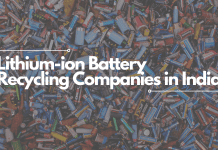EV Battery Recycling and Disposal
Ever since environmental challenges have impacted our planet, societies worldwide have been striving to adopt more sustainable approaches in various sectors. The mobility industry, being no exception, has witnessed significant changes in recent years. To address the escalating environmental concerns, the automobile industry has prominently embraced electric vehicles (EVs), predicting a transformative shift towards greener transportation. According to Allied Market Research, the global market for electric vehicles, which was valued at $163.01 billion in 2020, will grow by 18.2% between 2021 and 2030 to reach $823.75 billion. The lithium-ion batteries that power these emission-free vehicles are key to the emergence of EVs. While EVs present a promising solution to reduce greenhouse gas emissions and air pollution, the emergence of batteries in the scenario has brought forth new environmental challenges, particularly concerning recycling and disposal.
Here’s a look at the environmental effects of recycling and disposing electric vehicle batteries, and investigate sustainable alternatives to guarantee an eco-friendly and responsible future for the ecosystem supporting electric mobility-
Environmental Impacts of EV Battery Disposal
Landfill Waste

Batteries for electric vehicles should never be disposed of improperly in landfills. These batteries contain hazardous substances including lithium, cobalt, and nickel that can poison the land and groundwater and damage both plant and animal life. As a result, strict regulations are required to guarantee the secure recycling and ethical disposal of EV batteries, protect the environment from potential risks, and advance a sustainable method of handling electric vehicle battery waste.
Resource Depletion
Concerns regarding resource depletion have been highlighted by the rise in demand for electric vehicle batteries. These batteries require lithium, cobalt, and nickel, three materials whose mining can deplete natural resources and disturb ecosystems. Some effects of mining practices include deforestation, habitat loss, and air and water pollution. Thus, to solve this problem, it is essential to look into alternatives like recycling and creating more ecologically friendly battery chemistries, ensuring a more responsible and eco-friendly method of obtaining raw materials for EV batteries.
Greenhouse Gas Emissions

Even while utilizing electric vehicles helps reduce greenhouse gas emissions, the mining of their raw materials and improper battery disposal can result in increased emissions. The carbon footprint associated with the manufacture and disposal of electric vehicles can outweigh the environmental benefits of driving them. Thus, adopting sustainable battery recycling processes, investing in low-carbon technologies, and advocating a circular economy plan that maximizes resource efficiency, are all critical if we want EVs to continue to benefit the environment.
Sustainable Solutions for EV Battery Recycling
Battery Reuse and Second-Life Applications
Repurposing the batteries for second-life uses is a sustainable way to reduce the negative effects of electric vehicle battery disposal on the environment. Many batteries have a significant amount of usable capacity left even after being used in vehicles. These batteries can increase their lifespan and lessen the demand for new battery production by being incorporated into energy storage systems. This strategy reduces waste and raises the general effectiveness and sustainability of managing the batteries for electric vehicles.
Improved Battery Design for Recycling
For sustainable end-of-life management, electric vehicle batteries must be designed with recycling in mind. Standardizing battery chemistries and improving ease of disassembly can speed up recycling, making it more practical and sustainable from an economic and environmental standpoint. Batteries with simple component separation reduce the production of waste and the environmental effect of raw material extraction by facilitating the efficient recovery of essential elements like lithium, cobalt, and nickel. Furthermore, by placing a focus on recyclability in battery design, the circular economy is supported and the ecosystem for electric mobility is made greener and more sustainable.
A Sustainable Journey Towards Zero Waste!
The rapid growth of electric vehicles (EVs) has undoubtedly contributed to the mitigation of environmental challenges by reducing greenhouse gas emissions and air pollution. The switch to EVs has, however, also raised new environmental concerns with battery recycling and disposal. We must tackle these problems with sustainable solutions to protect the environment and advance a brighter future. Furthermore, to lessen the environmental impact of electric vehicle batteries, it is essential to embrace battery reuse, improve recycling design, and invest in cutting-edge recycling technology. Consequently, we can create a more sustainable and ethical electric mobility ecosystem by supporting a circular economy and encouraging appropriate end-of-life management.
Read more:Why is Lithium-Ion battery most commonly used in Electric Vehicles?







